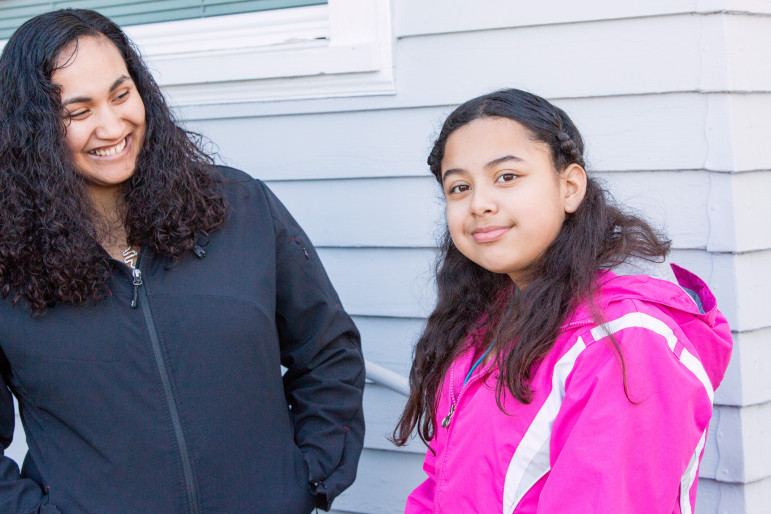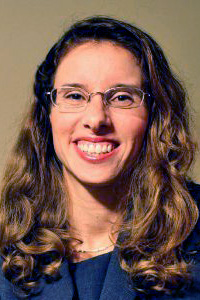
Friends of the Children
Natasha (left), a professional Friend, meets with one of the children she mentors.

Jessica R. Kendall
By the time Natasha was 8, she barely spoke in school. In fact, she rarely spoke to any adults. Raised in Portland, Ore., by her great-grandmother, Natasha was paralyzed by her fears of rejection, distrust and low self-esteem.
She had sporadic contact with her parents, and other adult family members repeatedly told her she would never amount to anything. One of the few positive adult figures in Natasha’s life was Neil, her younger brother’s mentor, and someone who would ultimately change the trajectory of her life.
Neil was a salaried professional mentor, employed by what was at the time a new mentoring program in Portland called Friends of the Children.
The concept of mentoring children and adolescents is not new. In fact, many programs, like Big Brothers Big Sisters, have been mentoring and working with children for more than a hundred years. Research has also long suggested that caring, positive adult role models can, under the right circumstances, help mitigate the risk factors faced by many children and adolescents.
But Friends of the Children was different.
Under the Friends of the Children model, professional mentors called “Friends” are intensively trained in advance. They go into public school systems and over a six-week observational period identify kindergartners who are most at risk of school failure, behavioral and mental health problems and who come from chaotic, impoverished, even violent or abusive homes.
Conducting a needs and risk assessment like those used by child welfare agencies, Friends scour the school systems for “children with the fewest protective factors,” said Terri Sorensen, president of Friends of the Children. Friends serve those most at risk, offering support and services that see them through high school graduation, she said.
“As long as a child remains within 30 miles of our offices, we stay with them, no matter what, throughout their childhood,” said Sorensen. That often equates to 12½ years where a child is paired with a Friend, who spends at least four hours a week with him, in his classroom, community and home.
Each Friend, who works with eight to 11 children at a time, builds an individualized roadmap for each child that focuses on school success, making good choices and fostering social and emotional development. They develop these roadmaps to achieve the group’s longer-term goals of ensuring each child completes high school and avoids teen pregnancy and the criminal justice system. And, while they are helping children, these Friends also work with and provide supports to the whole family, including parents and guardians.
In its 22nd year, Friends of the Children’s ongoing evaluations show that the model works. A Harvard Business School Association of Oregon independent assessment of the Portland chapter found that for every dollar invested,Friends of the Children generates a more than $7 return on social service system costs. That amount yields approximately $971,000 in community and social savings for each child who graduates from the program at 18.
The ongoing, cross-site randomized control trial, which began in 2007, shows that children who complete the program, on average, demonstrate more behavioral strengths, more positive school behavior and fewer externalizing behavioral problems than control group children who didn’t receive the program’s supports.
Annual third-party evaluations of Friends of the Children’s Portland chapter also show that while less than 40 percent of the parents earned a high school diploma or GED, 85 percent of program graduates do. Similarly, 96 percent of graduates avoid justice system involvement, despite the fact that almost half have had at least one parent who has been incarcerated; 98 percent avoid early parenting, even though 86 percent were born to a teen parent.
Today Friends of the Children serves 1,400 children across seven chapters and affiliates in New York, Florida, Massachusetts, Oregon and Washington state. Its national office in Portland helps chapters and affiliates build capacity and raise funds from private foundations and public agencies. In the next three years, the program plans to more than quadruple the number of children it serves.
It was during this steady expansion that Natasha, due to her brother’s Friend, Neil, was assigned her own Friend through the Portland chapter. When Natasha’s great-grandmother passed away when she was 12, Neil stepped away from the program to become her and her three siblings’ legal guardian.
Six years later, Natasha was the first female in her family to go to college. Around the time she graduated, Neil passed away and it was at his funeral that she realized what career she wanted to pursue.
Today, Natasha is a Friend in the Portland chapter, working with nine girls ranging from 12 to 17. As part of her job, she takes them on college tours, helps connect them with after-school activities and encourages each to “be adventurous and enjoy their childhoods,” she said. When it’s appropriate, she also shares her own childhood experiences. “They know who I am, they trust me and are honest about what they want and need,” she said.
Neil never lost hope in Natasha or her siblings. Today, they are each succeeding in their own way, moving beyond the poor school outcomes and generations of poverty they came from.
Natasha’s story is not unique, Sorensen said. The relationships between our Friends and children “don’t go away,” she said, “these are lifelong bonds, and as many of our youth start to succeed in adulthood, they share their stories and want to give back.
“It is our mission,” she said, “to spread our model across the country, to break the cycle of intergenerational poverty and to ensure each child who needs one has a Friend.”
Jessica R. Kendall, J.D., is a technical specialist at ICF International where she works on projects relating to Temporary Assistance for Needy Families and workforce programs. She previously represented children in child protection proceedings.

























